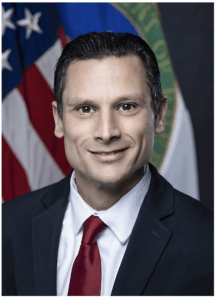Meet Joseph DeCarolis, US Energy Information Administration Administrator
The US Senate confirmed Joseph DeCarolis, President Joe Biden’s nominee for administrator of the US Energy Information Administration, on March 31. Prior to his current appointment, DeCarolis served as a professor in the department of civil, construction, and environmental engineering at North Carolina State University. His career and publications have centered on addressing energy and environmental challenges at the intersection of engineering, economics, and public policy, and his core research involves the development and application of energy system models to examine energy futures under uncertainty.
What about this position appealed to you?
As an energy systems analyst, I’ve been a long-time consumer of Energy Information Administration products. I was therefore incredibly honored to have the opportunity to lead such an important agency. EIA’s information underpins our collective understanding of the US energy system and is a crucial source of sound, unbiased data and analysis for decision-makers in both the public and private sectors. EIA data is pretty ubiquitous. If you randomly pick a news item or research study focused on the US energy system, it very likely includes a reference to our data.
Describe the top 2–3 priorities you have for the Energy Information Administration.
First, EIA must strive to make its information more accessible and transparent. This includes making EIA models open source and integrating different data streams into real-time, online dashboards. Transparency and accessibility engender trust, foster understanding, and allow stakeholders to make better use of EIA products.
Second, EIA’s modeling capability should be expanded to examine a wider range of future scenarios that include the full spectrum of available fuels and technologies. The models should be tested under a wider range of assumptions to better evaluate potential outcomes pertaining to cost, emissions, reliability, and security.
And third, during this dynamic period of energy transition, it’s important that EIA provides data that delivers new insights into community-level energy usage, trends, and impacts.
What do you see as your biggest challenge(s) for EIA?
Global energy markets are in a period of high volatility and are simultaneously transitioning to low carbon energy sources. Stakeholders understandably have a number of important and relevant questions pertaining to these issues, and it has been a challenge to develop the complex data and analysis to keep pace in a period of relatively flat budgets.
For example, the Bipartisan Infrastructure Law sets forth several requirements for EIA that are in line with the priorities I noted above; however, the law does not provide funding to EIA.
Fortunately, we have an incredibly talented team of statistical and analytic professionals who are working hard to meet these challenges.
How can the statistical community help you?
The challenges of the energy transition present a number of areas in which the statistical community can help EIA by providing methodological guidance on key statistical issues. As an example, we are currently exploring ways in our energy consumption program to use small area estimation to develop community-level estimates that help characterize energy consumption and price impacts at a more granular level. The ASA Committee on Energy Statistics provides a key venue for exchanging ideas, and our recent joint meeting in September was quite successful in this regard. I look forward to continuing this ongoing relationship.
I also believe the broader federal statistical community has tremendous expertise that can potentially be leveraged to help EIA effectively and efficiently address the energy transition—as we examine deep decarbonization pathways in our data and analysis, for example.
Prior to your tenure, what do you see as the biggest recent accomplishment of the agency?
Rather than identify a singular accomplishment, I would highlight the deep expertise we offer to government, industry, and the public on a regular basis. For example, we frequently respond to requests from US Department of Energy leadership, the White House, and Congress about a range of important energy issues to help inform the decision-making process. In addition, we produce daily Today in Energy articles that help educate decision-makers and the general public about topical energy issues. EIA’s Energy Explained is another great resource that provides informative, easy-to-understand information about a wealth of energy topics and serves as an example of how we strive to meet the full spectrum of our customers’ needs.


















